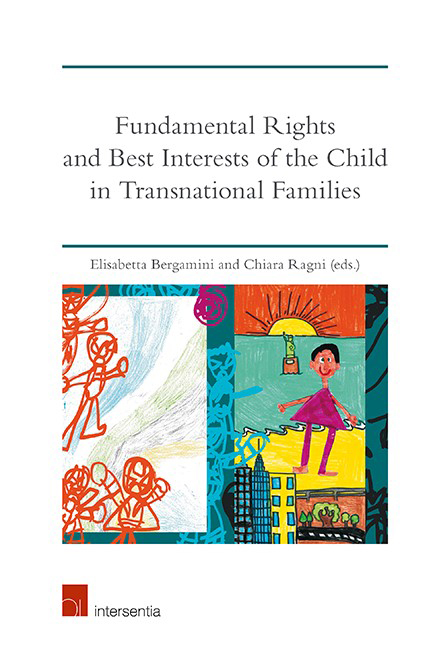Book contents
- Frontmatter
- Dedication
- Preface
- Acknowledgements
- Contents
- List of Cases
- List of Authors
- PART I THE IMPACT OF HUMAN RIGHTS AND OF THE BEST INTERESTS OF THE CHILD ON EU FREE MOVEMENT AND MIGRATION LAW
- Human Rights of Children in the EU Context: Impact on National Family Law
- Protecting EU Citizen Minors' Right to Identity in the Transnational Family Context
- The Best Interests Principle's Impact on Decisions Concerning Asylum-Seeking and Refugee Children
- Human Rights and the Best Interests of the Child in European Family Reunification Law
- Rainbow Families and EU Free Movement Law
- Kafala and Family Reunification of Third-Country Nationals
- Against a Girl's Will: Child Marriages, Immigration and the Directive on Family Reunification
- PART II THE BEST INTERESTS OF THE CHILD AS A CONCERN OF HUMAN RIGHTS AND EUROPEAN PRIVATE INTERNATIONAL LAW
- Index
- About the Editors
Human Rights and the Best Interests of the Child in European Family Reunification Law
from PART I - THE IMPACT OF HUMAN RIGHTS AND OF THE BEST INTERESTS OF THE CHILD ON EU FREE MOVEMENT AND MIGRATION LAW
Published online by Cambridge University Press: 12 November 2019
- Frontmatter
- Dedication
- Preface
- Acknowledgements
- Contents
- List of Cases
- List of Authors
- PART I THE IMPACT OF HUMAN RIGHTS AND OF THE BEST INTERESTS OF THE CHILD ON EU FREE MOVEMENT AND MIGRATION LAW
- Human Rights of Children in the EU Context: Impact on National Family Law
- Protecting EU Citizen Minors' Right to Identity in the Transnational Family Context
- The Best Interests Principle's Impact on Decisions Concerning Asylum-Seeking and Refugee Children
- Human Rights and the Best Interests of the Child in European Family Reunification Law
- Rainbow Families and EU Free Movement Law
- Kafala and Family Reunification of Third-Country Nationals
- Against a Girl's Will: Child Marriages, Immigration and the Directive on Family Reunification
- PART II THE BEST INTERESTS OF THE CHILD AS A CONCERN OF HUMAN RIGHTS AND EUROPEAN PRIVATE INTERNATIONAL LAW
- Index
- About the Editors
Summary
INTRODUCTION
Family unity is a strong natural concept protected in European human rights law through the right to family life under Article 8 of the European Convention of Human Rights (ECHR) and Article 7 of the EU Charter on Fundamental Rights (the Charter). Furthermore, Article 10 of the UN Convention on the Rights of the Child (CRC) provides that States must handle applications for family reunion involving children in a positive, humane, and expeditious manner. Article 9(1) further specifies that children shall not be separated from their parents against their will if separation is not in the best interests of the child. The principle of the best interests of the child is codified in Article 3(1) CRC and in Article 24(2) of the Charter. It is a guiding concept in migration cases involving children. Nevertheless, we have to face the difficulties that exist in making this concept operational in legal reasoning.
Due to migration, family members are sometimes separated from each other by borders. The European Court of Human Rights (ECtHR) jurisprudence holds that, as a matter of well-established international law and subject to its treaty obligations, a State has the right to control the entry of non-nationals into its territory. Furthermore, a conditional right to family reunification follows from EU migration law. Where minors are involved, this right is even stronger because of their vulnerability and the special protection afforded to them by international and European law. The key question is as follows: in EU law, how should the interests of the State be balanced against that of family unity and the best interests of the child?
This chapter analyses various legal situations in which the host country interferes in the relationship of the minor with his or her parent(s) by denying access. The right to family reunification in these situations is then examined, and the balance between the right of States to secure their borders and the right of migrant minors to be reunited with their parents, or vice versa, are discussed. Decisions concerning non-admission of a parent or child may lead to the separation of parents and children, leading to the family's ability to exercise the right of unity of the family and the right to family reunification. Consequently, the position of unaccompanied or separated migrant minors is considered only if family reunification is an option.
- Type
- Chapter
- Information
- Publisher: IntersentiaPrint publication year: 2019



